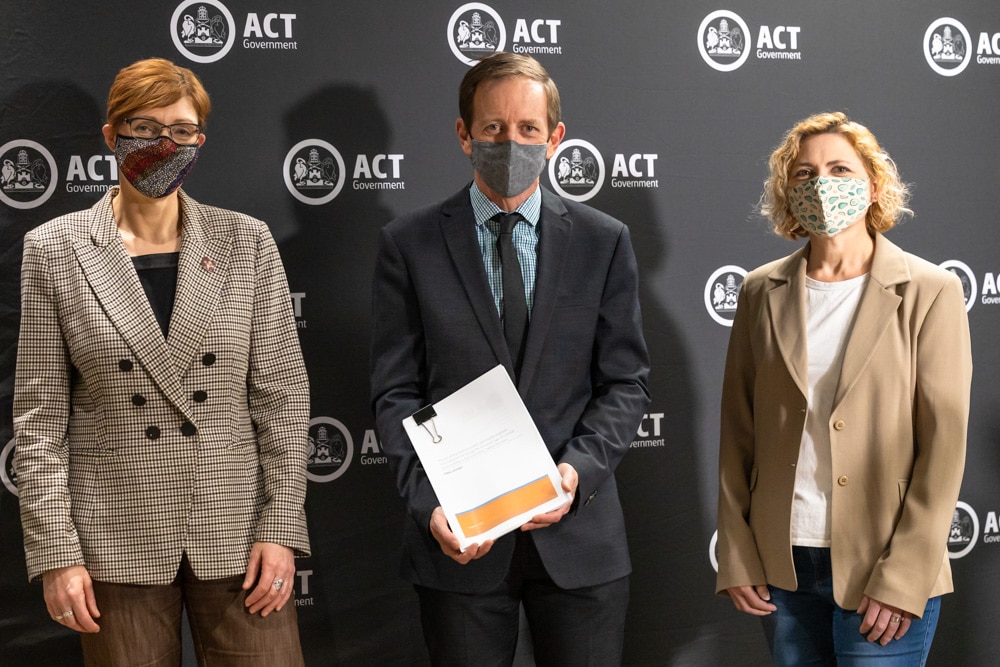More and better support will be needed for children if the ACT Government raises the minimum age of criminal responsibility (MACR) from 10 to 14, according to an independent review published today.
Earlier this year, Attorney-General Shane Rattenbury announced he would introduce a bill to make the ACT the first Australian jurisdiction with a MACR of 14. Currently, Mr Rattenbury said, children as young as 10 – one of the lowest ages in the developed world – can be charged, convicted, and incarcerated for a criminal offence.
“This is not the policy setting we want here in the ACT,” Mr Rattenbury said. “We want instead to put in place a therapeutic support system. We want to see young people … given the opportunity to put their lives back on track, and ideally … to have lesser involvement in the criminal justice system.”
In February, the ACT Government commissioned an independent review headed by ANU Emeritus Professor Morag McArthur, founding director of the Institute of Child Protection Studies, to study the gaps in the service system that must be filled to meet the needs of children and young people aged 10 to 13.
The report states that the ACT has limited prevention, early intervention, and individualised support services for children, particularly for Aboriginals and Torres Strait Islanders. It recommends a ‘wraparound’ service that would develop individualised child and family-centred plans, including crisis accommodation and a secure therapeutic facility for children who need mental health treatment and who may harm themselves or others. The report also says the ACT needs a plan to develop a trauma-informed workforce, and to make the sector more collaborative, child and young person-centred, and culturally safe for Indigenous people.
Children who end up before the courts or in youth correction can become lifelong offenders; as Mr Rattenbury said, they graduate to the Alexander Maconochie Centre, ACT’s prison.
But children at risk of offending often have disability, underlying trauma, or poor mental health, said Rachel Stephen-Smith, Minister for Families and Community Services. Many leave school early, become drug or alcohol addicts, are victims of family violence or sexual abuse, and risk homelessness.
“Their behaviour is a maladaptive response to trauma, rather than a deliberate crime,” Ms Stephen-Smith said.
Early intervention, the government believes, will help them. Sustained effort and a strong support system, Mr Rattenbury said, will help them put their best foot forward in life, and stop young people from being involved in the criminal justice system.
But, the report reveals, the ACT service system lacks co-ordination and integration: services do not share information; the service struggles to help children with multiple needs; there are few specialist and generalist programs; there are not allied health professionals to help traumatised children; service delivery is inflexible; the system is difficult to navigate; understanding of child-specific familial and cultural needs is limited; and there are long waiting lists for specialized services.
Demand outstrips the availability of services: mental health and alcohol and drug services are hard to access, and children aged 10 to 13 are not eligible for many services in the ACT. They are too young to access adolescent services, and too unwell or complex for early intervention services, but not complex enough to access specialised services. Their comorbidities (disabilities or trauma responses) may exclude them from mental health services. As a result, child protection or Youth Justice services might only intervene when problems escalate.
“This report tells us that some gateways are missing,” Ms Stephen-Smith said. “Sometimes, young people have to come into contact with the justice system in order to get access to the services and supports for them and their family that could have made more of a difference, if only they’d been available earlier.”
Emma Davidson, Minister for Youth Justice, said the ACT should reimagine its entire youth justice system so children, young people, and their families were better supported through early intervention and rehabilitation.
“This report will help us to understand what we can do to make that happen,” Ms Davidson said.
Change the Record, an Aboriginal-led justice coalition, welcomed the ACT’s determination “to change the archaic, harmful laws” that imprisoned children. Co-chair Cheryl Axleby said: “Aboriginal and Torres Strait Islander kids bear the brunt of bad policies and bad policing. Our kids suffer when governments build new prisons instead of investing in adequate housing, supports in schools and family services. This ACT report shows how governments can do things differently, by supporting our kids to thrive instead of locking them away.”
A coalition of ACT youth, family and legal service providers – including the Youth Coalition of the ACT and Children and Young People Commissioner, Jodie Griffiths-Cook – also welcomed the release of the roadmap to Raise the Age.



